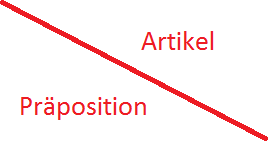
4.1.1 Fusion of preposition and article
In order to explain some issues we need more complex sentences and these sentences contain very often grammar problems and structures that had not already been disussed. Everything that has not already discussed will be explained later. Right now for instance there is no need to understand the use of pronouns and the position of pronouns in a sentence, we will discuss that later. Right now we are only discussing the fusion of prepositions and articles. The pronouns are irrelevant right now. In other words: As long as we didn't have explained all the elements we need to form more complex sentences, we work with a didactical motivated word by word translation. The result is not very English, but helpful to understand the Portuguese construction. If we have all the necessary things, we won't do that anymore. Right now we are as well not interested in the different meanings of the prepositions. There is a whole chapter about that.
The prepositions a (to), de (of / from), em (in), por (because) fuse with definite article. (See a complete list below.)
| dos = of the / from the | ||||
| Eu | o* recevi | dos | homens. | |
| I | it got | from the | men. | |
* o is he / it. A neural pronoun doesn't exist in Portuguese. For a detailed discussion of the pronouns see chapter 6.
There is no difference in the form between article and personal pronoun accusative in Portuguese. Furthermore the articles have to agree in gender and number with the noun they refer to. In other words we have masculine / feminined singular and masculine / feminine plural.
| article and pronoun | article | pronoun |
| o (homem) | the (man) | he |
| a (a mulher) | the (the woman) | she |
| os (homens) | the (men) | them (feminine plural) |
| as (as mulheres) | the (women) | them (masculine plural) |
If the preposition a is followed by the definite article / pronoun a / as they fuse to à / às, in other words, there is an acento grave. This phenomenon is called crase. In the table below we have only the definite article. Ao is as well to him, na is as well from her etc.. The table shows all kind of fusions.
 | o | a | os | as | |||||
| a | to | ao | to the | à | to the | aos | to the | às | to the |
| de | of / from | do | from the | da | from the | dos | from the | das | from the |
| em | in, inside | no | in the | na | in the | nos | in the | nas | in the |
| por | because of | pelo | because of the | pela | because of the | pelos | because of the | pelas | because of the |
| correct | O pai dá a maça | à | filha. | |
| => | O pai dá a maça The father gives the apple |
a a to the | filha. dautgher |
|
The combination preposition a + article / pronoun occurs very often, because the indirect object is marked with the preposition a that corresponds to the English to.
In the following sentences we have a lot of structures we haven't seen until know, but that is irrelevant.We will discuss these issues later. The didactical motivated word by word translation helps to understand the Portuguese structure more or less and a full understanding is not necessary right now.
| na = em + a / do = de + o | |||||||
| Ontem | eu | estava | na | festa | do | Julian. | |
| Yesterday | I | was | in the | party | of the | Julian. | |
| Yesterday I was at Julians party. | |||||||
| da = de + a (sair = to leave) / pela = por +a | |||||||||
| Eu | sai | da | loja | e | andei | pela | rua | calmamente. | |
| I | left | of the | shop | and | went | through the | street | calmly. | |
| I left the shop and went calmly down the road. | |||||||||
* Actually há steems from habere = haver => to have and is not longuer used in Portuguese nowadays. However it survived as an idiomatic expression há => it has => there is.
| ||||||||||||||||||||||||||||||||||||||||||||||||||||||||||||||||||||||||||||||||||||||||||||||||||||||||||||||||||||||